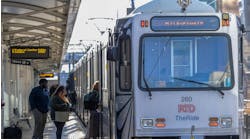House AV Legislation Would Leave Cities on the Side of the Road
National Association of City Transportation Officials, National League of Cities, Transportation for America and Natural Resources Defense Council have issued the following statement in response to draft legislation recently advanced by the House Energy and Commerce Committee’s Digital Commerce and Consumer Protection subcommittee.
The draft legislation on automated vehicles recently advanced by the House Energy and Commerce Committee’s Digital Commerce and Consumer Protection subcommittee leaves cities, states and citizens on the side of the road, unable to manage their roadways. NACTO, NLC, T4A, and NRDC urge Congress to prioritize safety, preserve the authority of local governments to manage their transportation system, and implement robust data-sharing requirements for automated vehicle operators.
Protecting public safety is the fundamental role of government. This legislation puts business interests above the basic safety of people using streets. The bill would allow autonomous vehicle companies to self-certify the safety of their vehicles without an independent reviewer, and would severely limit any government from protecting the wellbeing of its citizens. This is akin to trusting the fox to protect the hen house, and would clear the way for automakers and tech companies to deploy hundreds of thousands of automated vehicles without adhering to stringent safety standards.
Alarmingly, the legislation would restrict USDOT from performing its essential function of ensuring a safe transportation system. NACTO, NLC, T4A, and NRDC urge Congress to require independent certification of automated vehicles’ ability to operate safely in multi-modal city contexts prior to sale or commercial use.
The draft legislation would preempt state and local governments from regulating their own streets, crippling the ability of cities and states to ensure safe operations. The bill revokes the authority of cities and states to set requirements for vehicle performance or safety equipment, punishing states who demand cleaner air and a better quality of life for their citizens.
Local governments have made great strides to manage traffic congestion, reduce emissions and air pollution, and improve safety and mobility for people accessing jobs and opportunities. Stripping local governments of the authority to manage the vehicles on their roadways leaves them without the tools to ensure their streets work for the citizens they serve. NACTO, NLC, T4A, and NRDC urge legislators to give cities and states the authority to regulate automated vehicle operation on their streets as related to safety, traffic management, air pollution, and quality of life.
To reflect the expertise and critical role of state and local governments, NACTO, NLC, T4A, and NRDC urge the preservation of the Advisory Committee on Automated Transportation, which includes representation from cities, states, and transit agencies, rather than forming a duplicative Highly Automated Vehicles Advisory Council.
The draft legislation puts hundreds of thousands of untested vehicles on streets without giving state and local governments critical information about where and how those vehicles are operating. Automated vehicle technology has the potential to provide aggregated information about how people and goods move through our streets. But without access to data, city and state governments will be blind to the impacts of emerging transportation technologies.
Understanding vehicle movement at the corridor level provides immense value for governments and citizens. Real-time data on vehicle speeds, travel times, and volumes has the potential to inform speed limits, manage congestion, uncover patterns of excessive speeds, evaluate the success of street redesign projects, and ultimately improve productivity and quality of life. Data on vehicle collisions and near-misses allows cities to proactively redesign dangerous intersections and corridors to ensure safety for all street users.
NACTO, NLC, T4A, and NRDC strongly recommend that data on vehicle movement, safety, and performance, as related to safety and traffic management, be reported and submitted in an aggregated and anonymized format through a third-party intermediary platform, freely accessible to local governments, to ensure consumer privacy and safeguard competitive concerns while giving governments the information they need to manage their assets and protect public safety.
The draft bill handcuffs our transportation leaders, revoking their ability to unlock the transformative potential from this innovative technology.
NACTO, NLC, T4A, and NRDC strongly recommend that automated vehicle deployment be conditioned on stringent safety standards, that local governments maintain the authority to manage the vehicles on their streets, and that data reporting be central to federal legislation.


